
Why Is SEO Important for Financial Advisors?
After collaborating with more than 350 advisors on their search engine optimization (SEO), we’ve gained valuable insights.
- Prioritizing essential terms: Discover which keywords hold greater significance for your success.
- Amplifying referrals through SEO: Uncover how SEO can bolster your referral generation process.
- Recognizing the need for assistance: Unsure about your SEO? Learn the indicators that signal you may need help.
Take a few moments to watch this short video, where we discuss the fundamental aspects of SEO tailored for financial advisors.
SEO for Financial Advisors: Let’s Get Started!
We know that for most financial advisors, who don’t know a lot about it, SEO can seem overwhelming. It doesn’t have to be. In today’s competitive landscape, it’s more important than ever for advisory firms to complete basic foundational steps to secure their place in the eyes of Google.
What Is Search Engine Optimization (SEO)?
Search engine optimization (SEO) is the practice of increasing your website’s traffic by helping people find your site online. Believe it or not, there is a lot of competition to be the top search engine (and money to be made by being the best), so Google, Yahoo, and Bing invest hefty resources in trying to return the best search results for their users.
How can they tell which results are best for a given search? They look for behavioral clues from users, like which results they click on, how long they stay on a site, and whether they continue their search or not after visiting a website.
But not all SEO is created equal. Search engines treat different types of searches differently. If you search “headaches and insomnia,” you’ll be directed to a credible national medical website. If you search “plumber,” you’ll get a local service provider. Google knows that it wouldn’t be helpful to direct you to the definition of a plumber, or the history of the plumbing industry; it knows that most people who search for “plumber” want a highly rated plumber in their area.
The same is true for financial advisors. Because Google views financial planning as a local service, it uses local search engine optimization “clues” to return the most relevant local financial advisors. These clues include:
- Whether your business address, hours, and phone number are listed
- How recently your website has been updated
- Whether your business is featured on Google Maps
By making sure your website is optimized for local search, you can get more traffic to your website when people search for a financial advisor in your area.
SEO for Financial Advisors, Why Does it Matter?
Benefits of SEO
- More traffic
- Look better in search results (building trust instantly)
- Support your referral process
Challenges With SEO for Financial Advisors
Most businesses rely on online reviews to bolster their credibility. Although the SEC now allows financial advisors to utilize client testimonials, there are strict rules to adhere to—requiring innovative strategies to boost your business. How do you get at least five 5-star ratings? We can help!
Getting more traffic to your website is not the only reason it’s important to optimize your website for search engines. Optimizing your site also helps it look better in search results, by including optimized images, Google Business Profile (GBP) maps, business hours, and your logo.
Building out your search engine results page can make it easier for your existing clients to get directions to your office or find your phone number online. It can also help referrals from existing clients to find you and establish trust.
Establishing Credibility Online and Helping Your Referral Process
Building trust with your prospects is increasingly important. This starts with making sure your search results look as good as possible. As Michael Kitces, partner at Pinnacle Advisory Group, points out, “Even if they are referred by someone they trust, no one is going to give their life savings to a financial advisor without typing their name into Google.” Customers explore businesses online before they make decisions.
Even if they have already met you in person, potential clients look at your business online and form an opinion about how much they trust you. If a customer searches for your business in Google, what do they see? Are you hard to find online? Do you show up on the second or third page of search results? Do your social media profiles show up before your website? We want to make it easy for them to find you online and get a positive impression.
Getting More Organic Traffic to Your Website
The Internet has changed everything about how we live, from how we select a restaurant to how we choose a CPA or financial advisor. For financial advisors, showing up within relevant search terms can be a powerful marketing tool to get more traffic and more business.
There are two main ways to get more traffic to your website via search engines:
- Search engine marketing (SEM) or paid ads: Search engine marketing or pay per click (PPC) allows marketers to purchase traffic. Google sells placement within various searches at a price per click. Each time someone clicks your ad, Google charges your account.
- Search engine optimization (SEO): Think of the O in SEO as “organic.” With SEO, we are affecting the free or organic search traffic to your website. We aim to get your website to show up in those search results “organically” by being what Google considers the most relevant site to meet their search needs.
Why not use SEM and pay for clicks? It can get expensive in a hurry! For example, if you are a financial advisor in San Diego and you want people who searched for the term “financial advisor San Diego” to click through to your site, that would cost you between $31 and $35 per click. Ten clicks using PPC could cost $350 or more!

But with our SEO packages, Indigo Marketing Agency can invest just $2,000 to get you to show up in top search results month after month for free! Then you will see traffic coming to your site for “free” based on those search terms. If you’re interested in ongoing optimization for sustained online growth, our ongoing SEO package is perfect for you ($750/month, no contract). *Keep in mind, users who search certain terms might place more trust in businesses that show up organically than businesses that pay to be there.
SEO optimization is just one call away. Book a call to elevate your online visibility and boost relevant traffic today!
How Is SEO Different for Local Professional Service Providers?
The most effective way for financial advisors to use SEO is to build out your local online presence so that you show up higher in search results and look good when people search for your business (either directly or through keywords you’ve targeted).
At Indigo Marketing Agency, we’ve worked with hundreds of top financial advisors to optimize their websites and took two years creating and refining our SEO process. For our search engine optimization strategy, we combine the knowledge that we’ve developed building marketing programs specifically for financial advisors and combine it with SEO best practices.
Financial advisors have a unique position when it comes to SEO because many financial advisors have not completed even the most basic SEO work. There’s not a lot of SEO competition from most local advisors!
It is important to know the following for the financial niche:
- Industry Specifics: The financial advisory industry, like many other professional services sectors, traditionally lagged behind in adopting digital marketing strategies, including SEO. This delay was due to various factors, such as regulatory restrictions on advertising, concerns about client confidentiality, and a strong reliance on referrals.
- Regulatory Constraints: Financial advisors are often subject to strict regulations regarding marketing and advertising, which may discourage some from engaging in SEO efforts. Regulatory bodies like FINRA (Financial Industry Regulatory Authority) have specific guidelines on how financial professionals can promote their services.
- Lack of Awareness: Many financial advisors may not have been aware of the potential benefits of SEO or how it could be tailored to their specific needs. They might not have realized the impact it can have on their online visibility and client acquisition.
- Low Competition: Due to the factors mentioned above, there may be a lower level of competition among local financial advisors in the realm of SEO. This can create opportunities for those who do invest in SEO to stand out more easily in search results.
- Changing Landscape: While the financial advisory industry traditionally had limited online presence, the digital landscape is evolving. More advisors are recognizing the importance of having an online presence, and the competition for search engine rankings is likely to increase over time.
It’s important to note that the situation can vary from one region or firm to another, and the level of competition in SEO may differ accordingly. However, the idea that there is untapped potential in the financial advisory industry for those who embrace SEO aligns with broader trends in digital marketing. As awareness and competition grow, financial advisors will need to adapt their SEO strategies to remain competitive in the online space.
But there are challenges too. It’s true that the SEC revised its rules and now allows financial advisors to post testimonials, which opens up new avenues for you to showcase the positive experiences of your clients and enhance your online presence. But there are still restrictions on how detailed reviews can be. Part of SEO work leverages “local SEO” best practices, and financial advisors are not exactly like a local coffee shop. What is a well-meaning financial advisor to do?
How Can You Tell Where You Rank?
Before we get into exactly what you can do to improve your SEO, it’s a good idea to take a look at where you are starting and how your business appears on Google today. Make a note of your starting point so you can track your progress over time. If you need help figuring out where you rank, get your free SEO Audit Report for your site now!
Search for Your Business Name
First, go to Google.com and enter the name of your business to see if you come up. If you aren’t searching from the location of your office, enter your business city name too (e.g., “Center for Wealth Management, Troy, Michigan”).
If your website is not coming up as the top search result for your business name, that means your SEO needs some serious work. If you do not have a Google Business Profile page on the right sidebar with your information, that’s a good clue that you have not laid the SEO foundation for your firm yet. This is what an incomplete business listing looks like.
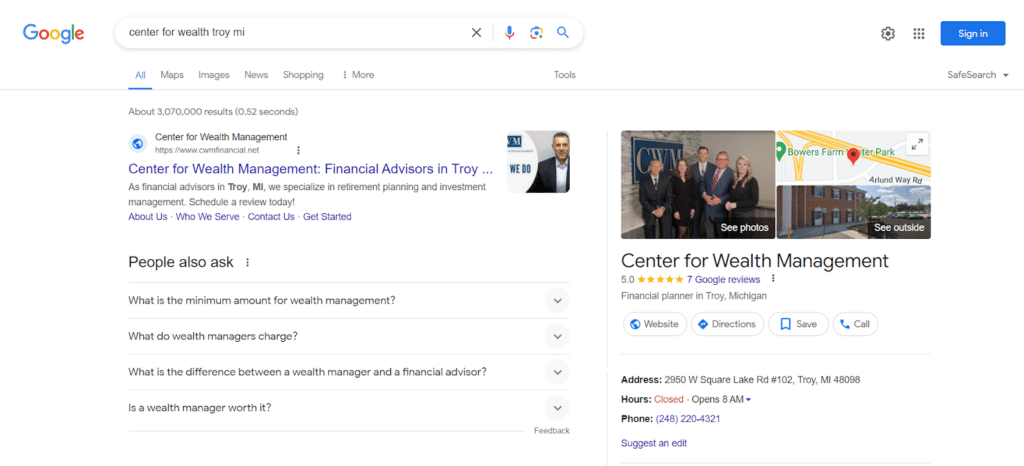
Search for Relevant Keywords
Next, you’ll want to see how you rank for relevant keywords. Enter a few keywords and your city name to see where your firm ranks, for example “financial advisor in Paradise, CA” or “financial planner in Portland, OR.”
Check the Google Places listings to see if your business shows, then scroll through the organic listings below the Google Places to see where you rank. Make a note of the page number you show up on and your overall rank for a given keyword.
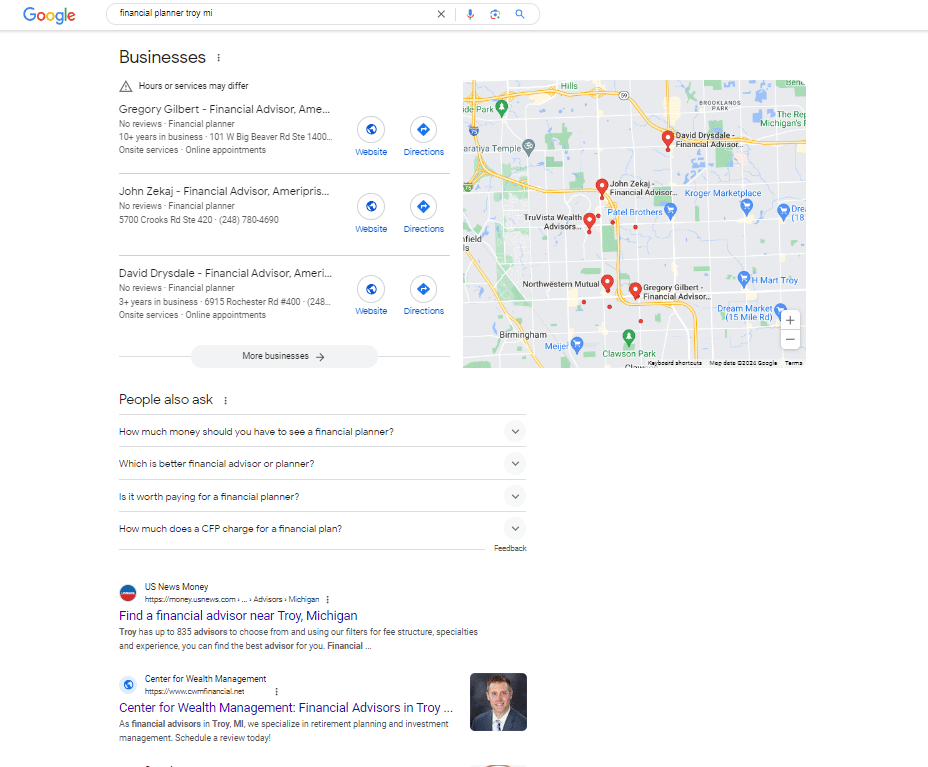
Search for Your Business on Maps
Finally, open up your map application on your smartphone and search for your business name. Make sure your office shows up on maps with the correct address, website, and phone number to make it easy for your clients to call you and get directions to your office.
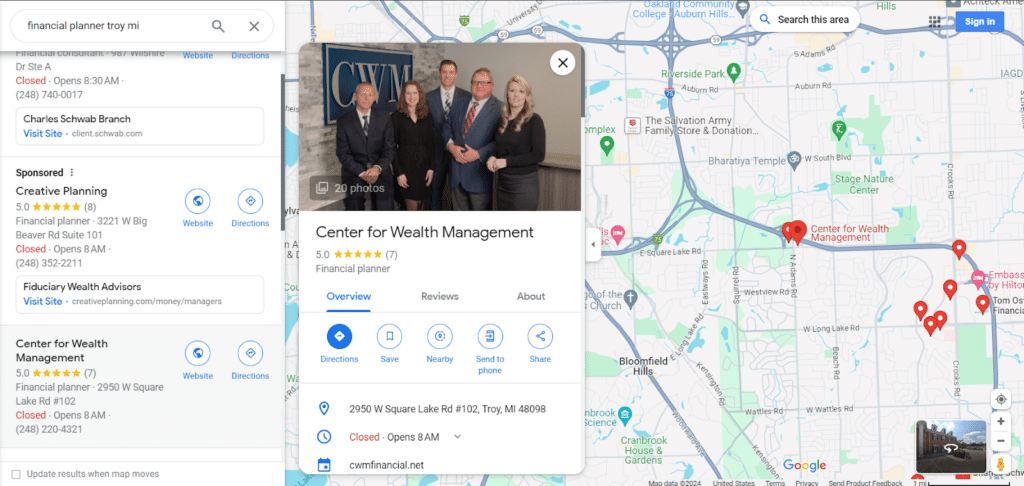
If you’re disappointed in the results of your search, don’t worry, it’s easy to make big changes in your SEO rankings with a few important actions. Read on to find out how.
The Best Keywords For Financial Advisors
Before you get started making any changes to your website or registering your business online, you’ll want to consider the keywords you’d like to target in the future so you can be consistent with your efforts.
Keyword traffic depends on simple supply and demand, so targeting high-volume keywords will mean you have more competition, whereas it may be easier to rank higher for lower-volume search terms, though you’ll have less traffic to capture.
Examples of keywords for financial advisors:
Financial advisor San Diego
Financial planning for women in Des Moines
Financial advisor business owners Chicago
You could also target services as a keyword:
Retirement planning Phoenix
Business valuation New York City
Estate planning in Jupiter Island, FL
Financial Advisor Or Financial Planner?
Many advisors aren’t sure if they should use the term “financial advisor” or “financial planner” in their keywords. I recommend using the term “financial advisor” because it gets much more search volume.
Here are the daily national search volumes for relevant keywords for professions as of October 26th, 2023:
Financial Advisor: 110,000
Financial Planning: 33,100
Financial Planner: 27,100
Wealth Management: 49,500
Investment Management: 9,900
And here are the search volumes for relevant keywords for services:
Retirement Planning: 33,100
Estate Planning: 27,100
Long-Term Care: 12,100
College Funding: 70
Make a list of up to three keywords (one profession and two services) you’d like to target and be consistent in your efforts for the most impact. Be sure to only choose one profession keyword to target or you risk diluting your efforts.
Keyword research is a foundational step in any effective SEO strategy, and understanding keyword difficulty is paramount in this process.
On-Page SEO vs. Off-Page SEO vs. Technical SEO
When it comes to improving your website’s visibility on search engines, understanding the differences between on-page, off-page, and technical SEO is crucial. Each one plays a significant role in helping your site rank higher in search results, but they focus on different aspects of your web presence.
On-page SEO refers to work we do on your website, like making changes to your site titles, meta descriptions, and the content on your website to help people find you. Google relies on the information within your website to determine what your website is about and whether it will return you as a relevant search result.
Off-page SEO, on the other hand, covers the work we do away from your website to help your search results, including listing your business with search engines. Search engines give hierarchical importance to the home page and headings on your website. They also look for important information like your title tags and meta descriptions to assess your site’s content.
Finally, technical SEO covers the behind-the-scenes aspects that help search engines crawl and index your site efficiently. This includes optimizing site speed, ensuring mobile-friendliness, creating a clear sitemap, securing your site with HTTPS, and using structured data. It’s the foundation of your site, ensuring everything runs smoothly.
Each pillar complements the others, forming a robust SEO strategy. On-page ensures top-notch, discoverable content; off-page builds authority; and technical keeps the site efficient.
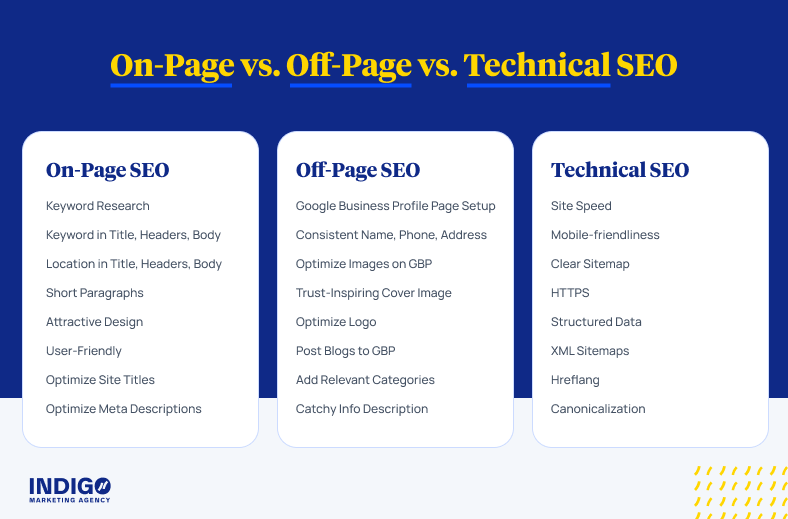
How to Improve Your Website’s On-Page SEO
To make an impact on your website’s on-page SEO, you will need to make some changes to the most important areas of your home page and update your tags and descriptions. You may need to enlist the help of your web designer to complete the process.
Update Your Home Page to Include Your Keywords
It may sound obvious, but most advisors do not capture their keywords on their website’s home page. Google gives preferential treatment to the content at the top of your home page, so you’ll want to make sure it’s accurate and includes your keywords.
Make sure you include the following: NAME OF YOUR CITY + KEYWORDS
Here are some examples:
- Fee-Only Financial Advisor in San Diego, California
- Retirement Planning in Roswell, Georgia
- Financial Planning for Business Owners in Newark, New Jersey
Check to Make Sure Your Website Is Mobile-Responsive
Google will penalize your site if it is not mobile-responsive, so it’s critical that you double-check your site. Go to responsivedesignchecker.com to find out now.
Updating Your Title Tags
After your home page, your title tags are the most important place to put your keywords. They’re the words that show up at the top of your browser and in search results.
Update your title tags via your website editor or ask your website developer to include your keywords in your title tags.
Each page of your site should have a different title tag that includes your targeted keywords and the main services you offer.
Here are some examples of good title tags:
- Home Page: Independent Financial Advisor Serving Teachers in South Texas
- Retirement Planning Page: Retirement Planning for Teachers in South Texas
Optimizing Your Meta Descriptions
The last step of on-page SEO is to optimize your meta descriptions, the short description that displays below your title tags within search results. This area is what searchers use to decide whether they’re going to click on your site, so it’s critically important.
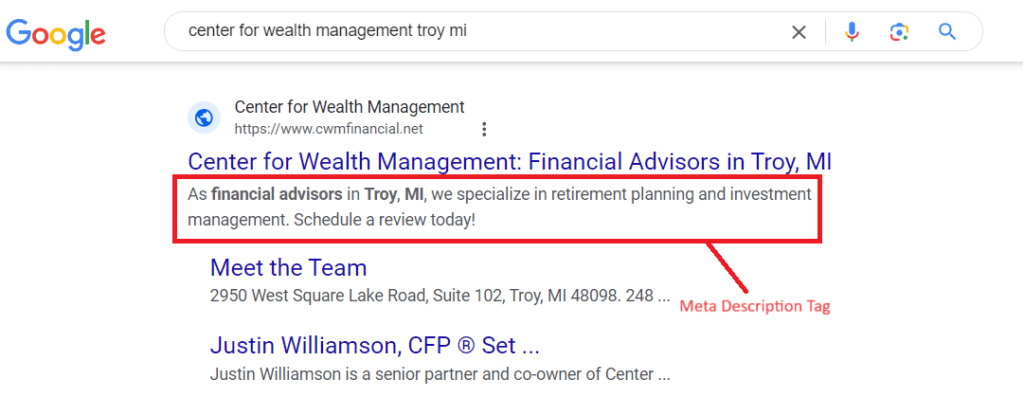
Perfect meta descriptions should be:
- Less than 320 characters
- Unique for each page
- Include a description of the page
- Feature your keywords
- Include a call to action!
Update your home page and at least your top five most visited pages. Here is an example of a great meta description:
- As an independent financial advisor in Austin, Texas, I specialize in retirement planning. Sign up now for your free retirement readiness review!
Using Schema Markup
Schema markup is a nifty tool that helps search engines get a better grasp of your website’s content. It’s a form of microdata that creates those eye-catching rich snippets in search results. Here’s why you should give it a go:
- Enhanced Search Results: Offers more detailed and informative search results for users.
- Improved Click-Through Rates: Rich snippets can entice more clicks.
- Better Understanding by Search Engines: Assists search engines in comprehending your content’s context.
Internal Linking
Internal linking is crucial for SEO. It helps distribute link equity throughout your site and guides visitors to related content. Here’s how to do it right:
- Use Descriptive Anchor Text: Clearly describe the linked page.
- Link to Relevant Content: Ensure the links are contextually appropriate.
- Keep it Natural: Seamlessly integrate links within your content.
Blogging for SEO
Regular blogging can give your SEO a significant boost. Here’s why:
- Fresh Content: Keeps your site updated with new, relevant information.
- Keyword Integration: Allows you to target specific keywords naturally.
- Engagement: Provides valuable content that keeps your audience interested and engaged.
How to Improve Your Website’s Off-Page SEO
If you’ve completed the steps to improve your website’s on-page SEO, that’s half the battle. The next step has to do with the local search ecosystem and your local listings.
Link Building
Link building is a key part of off-page SEO. It involves getting other reputable websites to link back to your site. This can be done through:
- Guest Blogging: Writing articles for other sites with a link back to yours.
- Partnerships: Collaborating with other businesses to share links.
- Content Marketing: Creating high-quality content that others want to link to.
High-quality backlinks show search engines that your site is trustworthy and relevant, boosting your rankings.
What Google Business Profile Means for Your SEO
Read this post to find out why Google Business Profile is the most underrated tool financial advisors have for SEO.
By claiming your Google Business Profile page, you’ll appear on the right-hand side of search results for your firm, along with your logo, photos, business hours, phone number, and more. In their never-ending quest to own as much of the Internet as possible, Google incentivizes businesses to register with Google Business Profile by giving preferential SEO treatment to firms who have claimed their page.
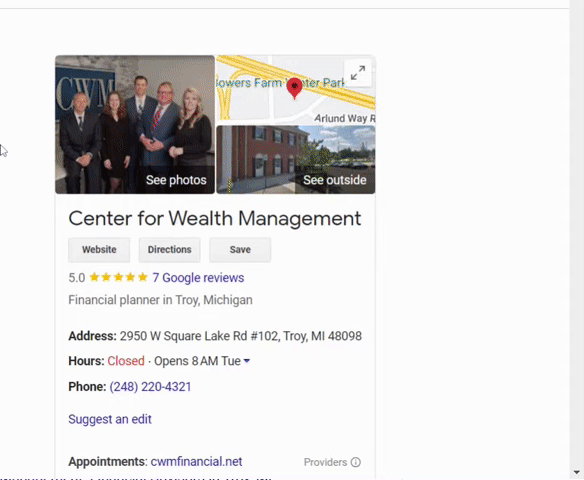
Your Google Maps Listing
Your Google Maps listing is verified via U.S. Mail through your Google Business Profile page. Once verified, it will display your firm on a map via a Google search and also when someone searches for you using the Google Map app on their phone. In addition to giving your site SEO “credit,” this can make it easy for clients and prospects to get directions to your office.
SEO for Financial Advisors: Where to Get Help?
If you’re looking for help with your website’s SEO, we have packages designed to take care of the most important SEO work. You can lay the foundation for SEO success with our one-time SEO option (one-time $2,000 investment) or maximize your SEO impact with our ongoing package for only $750 per month (no setup fee)!
What’s Included in Our SEO Packages?
We’ve identified the most important updates to make both on-page and off-page to help you rank for specific local keywords.
One-Time SEO: Boost your online presence with our top-rated SEO package for financial advisors and financial planners, attracting more relevant traffic and higher Google rankings. With a single payment of $2,000, you can unlock the full potential of your online presence. No ongoing costs or commitments. $2,000 one-time fee (No Monthly Fee)
Ongoing SEO: Get all the benefits of the one-time SEO investment plus ongoing optimization to ensure your online presence keeps growing. $999 / month (No Contract)
Our 10-step process for SEO for financial advisors includes:
- Google Business Profile listing optimization
- Optimizing photos with geolocation to include with GBP and Bing
- Connecting Google Search Console and submit sitemaps to check for errors and facilitate crawling
- Conducting research on relevant keywords
- Website title optimization and meta-description optimization
- Optimizing home page copy to leverage SEO best practices for target keywords
- Optimizing copy for two selected services keywords
- Integrating Google Maps into your site
- Adding local citations
- Adding Schema Markup to optimize your site for local searches
What to Expect
The work included in our one-time SEO package takes about 30 days to complete. We’ll watch the results happen in real time when the work is complete, we’ll deliver a report showcasing the work that’s been done and your updated online presence.
As Google indexes the citations we’ve built for your site, you’ll begin to see an increase in organic search traffic to your website. We expect to see at least a 20% increase in local search traffic within 45 days. Most of our clients receive new leads from their website within 2-3 months as a result of the SEO package. The increased website traffic will increase over time into the future, without any additional costs.
And should you opt for our ongoing SEO package ($999/month, no contract), you’ll reap the benefits of the one-time SEO investment alongside continuous optimization to ensure continuous growth of your online presence.
Ready to Partner With SEO Experts?
When someone searches for “financial advisor” or “financial planner” on Google, does your firm show up? Our cutting-edge SEO services are the solution you need! With our proven tactics and best practices, we can boost your rankings on Google and attract more high-quality traffic to your website.
If you still have questions about SEO, schedule a free consultation with one of our experienced marketing strategists. We would love to hear from you!

































